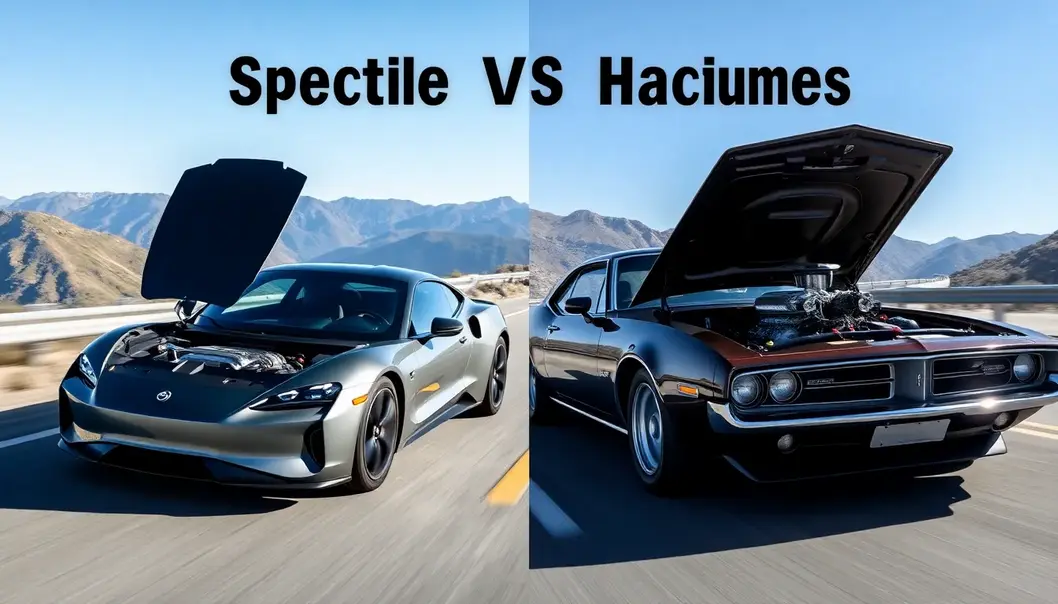Hey, gearheads and green warriors! Ever had a heated debate with your friends about whether electric vehicles (EVs) or gasoline cars are superior? It’s like deciding between Apple or Android, dogs or cats—everyone has their opinion! Buckle up as we dive into the world of electrifying torque, growling engines, and everything in between. We’ll explore how these two types of vehicles stack up in terms of performance, costs, and, of course, planet-saving potential. Whether you’re dreaming of driving a Tesla or revving up a Mustang, we’ve got the deets to fuel your next heated lunch conversation. Hold on tight; it’s going to be a thrilling ride!
Speed Demons and Torque Tyrants

In the pulse-pounding realm of automotive performance, speed and acceleration command the spotlight. Electric vehicles (EVs) and gasoline-powered cars are fierce contenders in this arena, each boasting unique strengths that appeal to adrenaline seekers and driving enthusiasts alike.
Electric vehicles have become synonymous with instant torque. Unlike gasoline engines, which require a build-up of revolutions per minute (RPM) to reach peak power, EVs benefit from immediate power delivery. The result is exhilarating, neck-snapping acceleration that can make an electric vehicle feel like a rocket ship on wheels. This instantaneous response is particularly appealing on urban roads where quick getaways from traffic lights or sudden overtakes in busy traffic can turn a mundane commute into an electrified joyride.
Gasoline engines, on the other hand, are not easily outdone when it comes to the stirring symphony of speed and style. The visceral pleasure of a gasoline engine is deeply rooted in the throaty growl that accompanies a revving internal combustion engine (ICE). This auditory thrill merges with the power delivery, creating a sensory experience that many consider integral to performance driving. As RPMs climb, drivers feel a building surge of power that is both thrilling and addictive. For many enthusiasts, this crescendo towards redline is unmatched by the often silent, albeit quick, nature of electric motors.
The technical facets of these powertrains illustrate why both Evangelists have cause to cheer. EVs utilize electric motors known for efficiency, and their design eliminates the lag typically associated with gear shifting. This single-speed transmission advantage ensures a seamless and uninterrupted acceleration curve. Meanwhile, the ICE, with its complex multi-gear mechanism, rewards skilled drivers with strategic acceleration control, employing techniques like heel-and-toe downshifting that exemplify driving prowess.
From a user experience perspective, some drivers might revel in the smooth silence of an EV’s whirring power—a drive that seems to plug them directly into the future. Yet, others might argue that the sensory engagement of a gasoline engine, complete with the meticulous orchestration of mechanical sounds, provides an irreplaceable connection to the art of driving. The weight of emotion in driving experience is difficult to measure, but can certainly sway preferences.
As automotive technology advances and preferences evolve, the debate over which vehicle type offers more thrilling performance remains vibrant. Whether it’s the electric sizzle that excites you or the gasoline roar that resonates with your soul, each choice offers a distinct experience that can leave you breathless. Understanding these nuances helps craft our personal relationships with vehicles, influenced as much by technology as by how they make us feel under our grip. As we move forward, each technology pushes the limits of what’s possible in performance driving, ensuring the debate between electric dreams and gasoline machines remains as lively as ever.
Dollars, Cents, and Eco Senses

Exploring the realm of automotive economics and environmental impact unveils stark contrasts between electric and gasoline vehicles. The decision to choose one over the other often hinges on both immediate and long-term financial implications, coupled with eco-conscious considerations.
Cost of Ownership:
Examining the cost of ownership starts with the initial price tag. Electric vehicles (EVs) typically have a higher upfront cost due to advanced battery technology. However, they tend to offer significant savings over time. Electricity is cheaper than gasoline per mile driven, which means lower fuel costs for EV owners. Additionally, government incentives and rebates can partially offset the initial investment.
On the other hand, gasoline vehicles often come with lower purchase prices, but they incur higher fuel expenses. Routine maintenance is usually more affordable for EVs due to fewer moving parts and no need for oil changes. In contrast, internal combustion engines require regular maintenance to keep running smoothly, adding to their long-term cost.
Environmental Impact:
From an ecological standpoint, EVs have zero tailpipe emissions, reducing urban air pollution and curbing greenhouse gases. The entirety of an electric car’s carbon footprint is contingent upon how the electricity is generated. Renewable sources significantly reduce the overall emissions.
Gasoline vehicles continue to emit a substantial amount of CO2 throughout their lifecycle. The extraction, refining, and transportation of fossil fuels contribute to environmental degradation. However, advancements in engine technology have been aimed at enhancing fuel efficiency, yet they still lag behind the ultimate sustainability offered by electrification.
Resource Consumption:
The manufacturing processes for both types of vehicles are resource-intensive, yet distinguishable in their impact. EVs rely on mined materials like lithium and cobalt for batteries, necessitating responsible sourcing and recycling to minimize environmental harm. Gasoline vehicles, backed by decades of fossil fuel extraction, have long reigned as resource demanders, but are slowly facing competition from cleaner alternatives.
Changing Landscape:
Driving green comes with personal benefits such as lower operational costs and a smaller carbon footprint, contributing to guilt-free driving experiences. The landscape of fuel efficiency is evolving, with rapid innovations accelerating the shift towards sustainability. This transformation is crucial as the world grapples with climate change and the urgency to conserve resources.
In this duel of dollars, cents, and eco senses, the scales often tilt towards electric vehicles when sustainability and long-term savings are prioritized. Nonetheless, the ultimate choice remains personal, influenced by immediate affordability and ecological values.
For more information, dive into sustainable living practices and how they’re shaping our future here.
Final words
So there you have it, the epic face-off between electric vehicles and gasoline cars. Ultimately, the ‘better’ choice depends on your priorities, be it speed, cost, or sustainability. Whether you lean towards the high-tech shimmer of EVs or the nostalgic roar of gas engines, both races show us new ways to redefine mobility. What’s your preference? Let the debate roll!
Embrace the future of driving! Discover our range of electric and gasoline vehicles today and find your perfect match.
Learn more: https://www.examplecardealer.com
About us
Example Car Dealer offers a vast selection of both electric and gasoline vehicles that fit every lifestyle and budget. Explore test drives, eco-friendly options, and financing plans with knowledgeable professionals ready to help you make the best choice for you and the planet.



